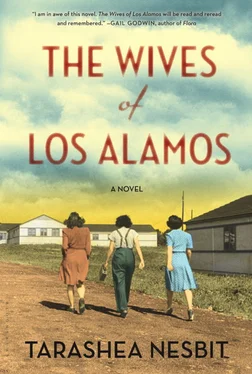IF OUR HUSBANDS were drafted, or our brothers, we hated the term theater to describe parts of a war. If we did not have anyone in battle, or if we had generations of men in our families who had been in battle, we loved the term theater , and we thought it conjured both the drama and the artifice.
WE HEARD NEWS that the U.S. invaded the Pacific islands of Saipan, Guam, and Tinian, but thankfully, all of our husbands who were drafted returned, because they were working on a war project already, and they did not leave for the Pacific. But they were here, on the Hill, in the Tech Area, fighting anyway.
HOW MUCH WAS parenting like warfare? Digging trenches, changing diapers, gunfire, or a child’s head hitting the corner of a coffee table—hours of boredom followed by seconds of terror. We felt we had been lied to about how lonely raising young children could be, about how for the first year we were not us, but them.
IN OUR SECOND pregnancy we birthed nine-pound children that others envied. We had lost our first and did not believe we were actually having a baby until it was on our chest, scooting down to find our breasts. We ate huge piles of mashed potatoes and meatloaf as soon as we delivered. We lost our baby weight while we rested for ten days at the hospital, or our stomach muscles never recovered and our party dresses no longer fit, but we could not afford or find the time to make another.
WHEN WE BROUGHT home the second child, our first child wanted to hold it, or our first child said, Put that back inside your belly .
OUR CHILDREN HAD squeaky voices, were dawdlers, kicked the chairs in front of them, would not make eye contact with strangers, or else they spoke rapidly, frequently, giggled, passed notes, started rumors. They were restless. They loved that there was not enough water to wash their faces or brush their teeth. They refused to put on their galoshes. They took off all their clothes in the street and blamed their stuffed animals for their mischief. In other words, they were just like us. Or they were like our husbands, or they were just like the black sheep of our families, our uncles, and we asked, How did this creature ever come out of me?
WE READ A book about the effects of war on children that said children, during wartime or not, bite and kick one another and steal toys without regard for the other children’s unhappiness. It said there was an ongoing war happening in the nursery. The outer world matches the real aggressiveness that rages inside every child . War is natural and therefore the effects of war on children were minimal. The authors said children arrive at shelters after their homes are destroyed and play merrily, and eat heartily, and this was proof that a 350-pound bomb does much less damage to a child than a divorce. And some of us agreed and felt better about the war and felt bad for Susan, whose husband was lost in the Pacific, and some of us felt angry at Myrtle for telling her husband she wanted to separate— Think of the children! we exclaimed to her, rattling the pages of the book in her face, but she would not listen.
OUR CHILDREN WERE newborns, were toddlers, were in elementary school or in junior high, were teenagers or were in college and therefore forbidden from visiting us on the Hill or from even knowing where we had disappeared to. Sara and Moll’s daughter would be leaving Los Alamos for college at the end of the summer and would not be allowed to come back to visit, nor could we visit her. Until the war was over. Until our work here was done. How long would that be?
A MILITARY PSYCHIATRIST came to town and asked if we wanted to have our children evaluated. We said yes because we wanted to hear from a professional how stunning our children were becoming. The psychiatrist gave them white paper and crayons and asked them to draw whatever they liked. Our children drew trains and Humpty Dumpty and the psychiatrist told us this meant that although our children seemed happy, they actually believed life was very hazardous. We frowned. We asked what we could do. But some of us thought, really, that perhaps our children were just perceptive. We could not disagree with our three-year-olds’ assessment. Life was hazardous. We thanked the doctor and we started questioning our children’s artwork anyway, because we were supposed to, and we asked ourselves, Are they happy? Really happy?
THE PSYCHIATRIST SAID we should have taken longer to wean them. Or we needed to tell them more often how smart they were. Or we needed to be less anxious, and the psychiatrist suggested we make an appointment for ourselves to come back alone next Tuesday.
THERE WAS ALWAYS something to get excited about, something to do, but many of us were getting bored. A secretary called, Fire! over the town PA system and we came running with a tub of dirty dishwater. A man had tossed his cigarette into a puddle of oil.
WE HATED THE barbed wire fence, although some of us hardly noticed it with time. But for a few of us the barbed wire fence was a reminder of concentration camps and we felt ill whenever it, which stretched along the border of our town, came into view.
MICHAEL, OUR HUSBAND’S friend whom we referred to in letters as our dour friend who misses New York , founded the Mushroom Society—a group that listened to Mahler recordings in the Tech Area late in the evening. And since many of us were not allowed in the Tech Area we stood outside the fence, near the north-facing windows, in the snow, to listen to the deeply serious and the utterly commonplace. The tentative measure of something slow to wake. The dark forest rumblings. Mahler’s sad, beautiful, and expansive music.
SANDY’S FAMILY WAS moving into Bathtub Row and for housewarming presents we bought her towels with our own initials embroidered on them and said, In case you want to invite us over!
WAS LOS ALAMOS a summer camp for adults? Some of us felt helpless at the arrival of unexpected guests, constant knocks on the door to borrow flour or to invite us to a bridge game, while others felt invigorated by it. But sometimes when our husbands tried to cajole us to go out and socialize with their friends we said, I’m in for the night—not feeling well, smiled, and settled back into the couch with a novel.
IN MANY WAYS, life on the Hill was the same day again and again. In a closed-off community, small misunderstandings could quickly become melodrama. A couple of surely innocent details said to one person became a subplot worthy of Tolstoy, a subplot written and rewritten by other members of the town. If a few facts had to be overlooked for the purposes of good storytelling, they would be.
AT A PARTY at the Director’s house Katherine pretended she was part of a conversation about potato casseroles but instead we watched her out of the corner of our eyes. She arranged herself to be standing alone with Henry, and we heard her ask, How’s Starla? with concern in her voice that we were sure she did not feel. Just fine, Katherine, just fine. If he got her hint, he rejected it.
IN AUGUST WE heard news that Paris was liberated. Paris , we said, recalling the place fondly—the spring we studied abroad and shared a studio flat with a balcony only two could stand on, a loveseat of a balcony that looked into the attic apartments of the building across the way, where we could see, even if we did not want to, a particularly pale man who seemed to enjoy not wearing clothing. Even if we never lived there, even if we never visited, even if we knew Paris only in books, we thought we knew the café life of the 14th arrondissement, the academic life of the 5th. Paris, liberated, their motto standing true— tossed by the waves but never sunk . Though we loved Paris, when a parade was called that evening, only twelve people participated—suggesting how far inward we had turned, or suggesting we were tired of the Hill’s alternating routine of trumpeting and nail-biting.
Читать дальше












